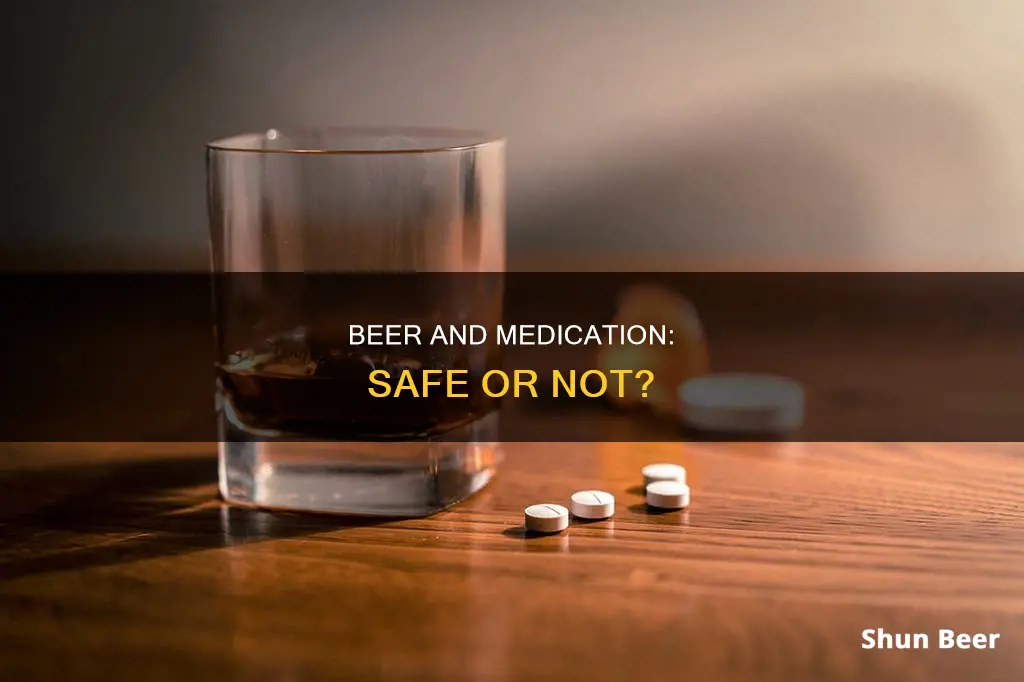
Drinking alcohol while taking medication can be dangerous and even deadly. Alcohol can interact with certain drugs, exacerbating side effects and decreasing the effectiveness of the medication. It can also make you feel the effects of alcohol more strongly. The combination of medication and alcohol can lead to serious health consequences, including overdose and even death. Older adults are particularly vulnerable to adverse effects from consuming alcohol alongside their medication. It's important to consult a doctor or pharmacist about whether it is safe to drink alcohol while on medication.
| Characteristics | Values |
|---|---|
| Effect on medication | Alcohol can make medication less effective or increase its toxicity |
| Effect on body | Alcohol can change how medication works in the body, leading to adverse health consequences including overdose and death |
| Side effects | Alcohol can worsen the side effects of medication, including drowsiness, dizziness, impaired judgment, and lack of coordination |
| Interactions | Alcohol interacts with many medications, including antibiotics, painkillers, antidepressants, and blood pressure medications |
| Safe drinking | It is important to consult a doctor or pharmacist to determine if it is safe to consume alcohol while taking medication |
What You'll Learn

Antibiotics and alcohol
Drinking alcohol while taking medication can be dangerous. Alcohol can interact with certain drugs and exacerbate the medical and mental health conditions they are intended to treat. Mixing alcohol and medication can lead to serious health consequences, including overdose and even death.
A few specific antibiotics affect how the body processes alcohol, which can lead to very unpleasant and sometimes dangerous consequences, including severe vomiting and raised temperature. Some antibiotics can cause an increased risk of unsafe side effects, including digestive problems such as stomach pain, diarrhoea, and ulcers, as well as flushing (reddening and warming of the skin).
It is never safe to combine alcohol with certain antibiotics, including metronidazole and tinidazole. These antibiotics interfere with the breakdown of alcohol in the body, leading to serious side effects such as nausea, vomiting, flushing of the skin, accelerated heart rate, dizziness, and drowsiness. It is also recommended to avoid alcohol for up to 72 hours after finishing a course of these antibiotics.
Other antibiotics that should not be mixed with alcohol include isoniazid, linezolid, doxycycline, and erythromycin. Drinking alcohol while taking these antibiotics may reduce their effectiveness and increase the risk of side effects.
For most commonly prescribed antibiotics, drinking within the UK low-risk drinking guidelines is unlikely to cause additional problems. However, it is always best to consult with a doctor or pharmacist before consuming alcohol while taking any medication, including antibiotics. They can provide personalized guidance based on specific medications and health status.
Breaking into the Beer Industry: A Guide to Success
You may want to see also

Painkillers and alcohol
Drinking alcohol while taking medication can have serious health consequences, and it is generally advised to avoid doing so. Alcohol can interact with certain drugs, exacerbating the medical and mental health conditions for which you are being treated. It is important to consult with a doctor or pharmacist for personalised guidance based on your specific medications and health status.
Combining alcohol with painkillers can be extremely dangerous and even life-threatening. Alcohol and pain medication can be a deadly combination, and it is best to avoid mixing them. Alcohol can increase the risk of serious side effects when taken with painkillers, such as stomach ulcers and bleeding. Additionally, taking high doses of acetaminophen (paracetamol) with alcohol can cause liver damage.
Prescription painkillers, such as opioids (e.g. oxycodone, hydrocodone/acetaminophen, and morphine), should never be mixed with alcohol. This combination can lead to severe drowsiness, memory problems, slowed or arrested breathing, lowered pulse and blood pressure, unconsciousness, coma, and even death.
Over-the-counter painkillers, such as ibuprofen and naproxen, should also not be mixed with alcohol. While this combination may not be life-threatening, it can increase the risk of serious side effects, including stomach ulcers and bleeding.
It is important to read the labels on your medication and consult a doctor or pharmacist if you are unsure whether it is safe to consume alcohol while taking a particular medication.
Viagra and Beer: A Safe Mix?
You may want to see also

Antidepressants and alcohol
Drinking alcohol while taking medication can be dangerous, and this includes antidepressants. Alcohol is a hypnotic-sedative, which means it depresses crucial bodily functions when taken in excess.
Mixing alcohol and antidepressants is generally not recommended for several reasons. Firstly, alcohol can worsen the side effects of antidepressants, and vice versa. Secondly, alcohol can trigger or worsen symptoms of depression in at-risk individuals. Thirdly, the combination can cause drowsiness, confusion, and loss of coordination, which can lead to falls and injuries. It is especially important to avoid driving or operating machinery when under the influence of both substances.
There are several different types of antidepressants, and the dangers of drinking alcohol vary depending on the specific medication. For example, drinking alcohol with tricyclic antidepressants (TCAs) can make people feel tired and uncoordinated, so it is not advisable to drink soon after starting this medication. However, after several weeks, when the side effects have subsided, it is generally considered safe to drink small amounts of alcohol. On the other hand, selective serotonin reuptake inhibitors (SSRIs) don't usually cause problems if someone drinks while taking them, although they can make patients drowsy, and alcohol can intensify this effect.
Monoamine-oxidase inhibitors (MAOIs) can cause a sudden and dangerous increase in blood pressure if combined with tyramine, a substance found in some beers, wines, and sherry. Therefore, people taking MAOIs are generally advised to avoid alcohol.
In summary, while mixing alcohol and antidepressants is not always dangerous, it is generally recommended that people on antidepressants abstain from alcohol, especially if they will be engaging in activities that require concentration and coordination, such as driving. It is important to consult a doctor or pharmacist for personalized advice, as the risks and interactions can vary depending on the specific medication and individual factors.
The Magic of Bottoms-Up Draft Beer: How Does It Work?
You may want to see also

Allergy, cold, and flu medication with alcohol
Drinking alcohol while taking medication can be harmful to your health. Alcohol can interact with certain drugs or exacerbate the medical and mental health conditions you're being treated for. Mixing alcohol and medication can lead to serious health consequences, including overdose and even death.
First-generation allergy medicines like Benadryl should never be mixed with alcohol due to the increased risk of severe drowsiness and the potential for dangerous side effects. The primary side effect of these medications is drowsiness, which is also one of the primary side effects of alcohol consumption. This double dose of drowsiness can not only impair your ability to function and increase the likelihood of an accident but can also lead to unconsciousness.
Second-generation allergy medications, such as Claritin, Allegra, or Zyrtec, are considered safer with alcohol, but caution is still advised as individual reactions may vary. These medications do not typically cause drowsiness or other side effects that are intensified by alcohol consumption. However, it is still recommended to avoid alcohol altogether while taking any medication.
Combining alcohol with cold and flu medications can expose you to several adverse health risks and may increase the chance of overdose. Alcohol can decrease the likelihood that you will experience symptomatic relief from your medication while increasing your likelihood of adverse effects.
Most over-the-counter cold and flu combination medications contain multiple active ingredients. When consuming one or more cold, flu, or allergy medications, read the labels carefully and pay attention to overlapping ingredients and any alcohol warnings. If you have any questions about what is safe to take, you can call your doctor or speak to a pharmacist.
Beer as Petrol: Can You Really Run on Hops?
You may want to see also

Alcohol and older adults
As we age, our bodies become more susceptible to the effects of alcohol. Older adults are more vulnerable to adverse effects from consuming alcohol alongside their medication. This is because, as we age, our bodies take longer to break down alcohol, leading to lower tolerance levels.
Older adults are also more likely to take medication, so there is a greater chance of alcohol interacting with their medication. This can lead to immediate risks, worsening health conditions, and adverse reactions with medications.
Older adults generally experience the effects of alcohol more quickly than when they were younger. This puts them at higher risk for falls, car crashes, and other unintentional injuries that may result from drinking.
The body breaks down and absorbs different medications in different ways. Drinking alcohol while taking medication can affect the speed at which the medication is broken down inside you – in some cases increasing the effect of the medicine and decreasing it in others.
Alcohol can also make some medications less effective by interfering with how they are absorbed in the digestive tract. In some cases, alcohol increases the bioavailability of a drug, which can raise the concentration of the medication in your blood to toxic levels.
Drinking alcohol can also make the side effects of a medication worse or even cause new symptoms. This is especially true if you are taking a medication that makes you sleepy or causes sedation. More intense side effects mean you might be more impaired after having one drink than you would typically be.
Older adults with mental health conditions such as depression, dementia, cognitive impairments, or anxiety are at greater risk for developing problems with alcohol. Alcohol abuse can then worsen the symptoms of those conditions.
If you are an older adult and are considering drinking alcohol, it is important to consult with your doctor or pharmacist first to ensure that it is safe for you to do so. They can provide personalized guidance based on your specific medications and health status.
Beer Hair Wash: Does it Work?
You may want to see also
Frequently asked questions
It depends on the medication and your health condition. Always consult your doctor or pharmacist about whether it is safe to drink alcohol if you are on medication.
Drinking beer after taking medication can cause harmful effects, including drowsiness, forgetfulness, impaired judgment, trouble concentrating, liver damage, or even death. Alcohol can also make the medication less effective or lead to dangerous health consequences.
Yes, there are several types of medication that should not be mixed with alcohol, including antibiotics, antifungals, anxiety medications, painkillers, antidepressants, blood pressure medications, and cholesterol-lowering medications.
If you accidentally drink beer while taking medication, consult a medical professional immediately. They will be able to advise you on the best course of action based on the specific medication you are taking and your individual health status.







